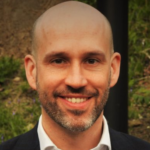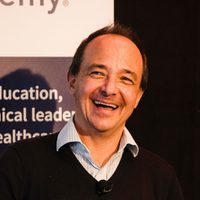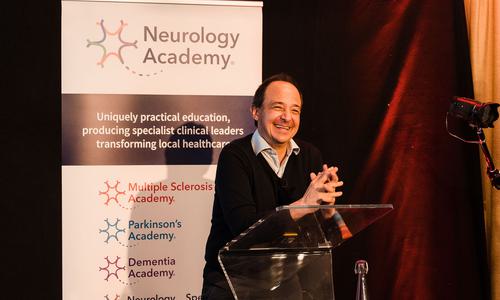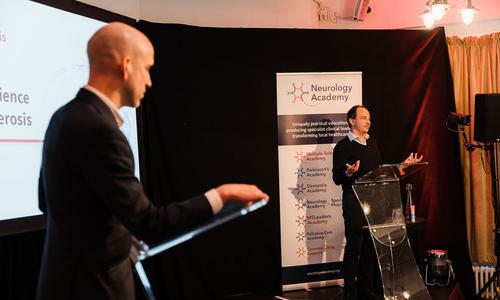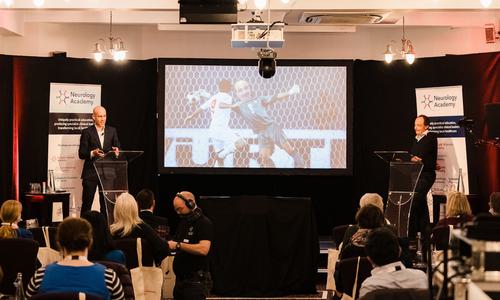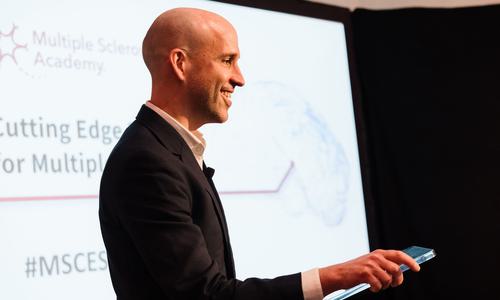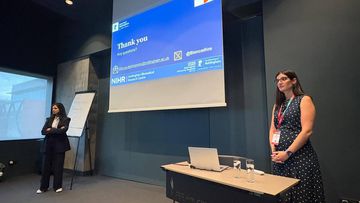Debate: Can we cure MS? - MS Cutting Edge Science
Event reportsDr David Paling
Honorary strategic director & consultant neurologist, Sheffield Teaching Hospitals NHS Foundation Trust
Prof Richard Nicholas
Consultant neurologist, Imperial Healthcare NHS Trust
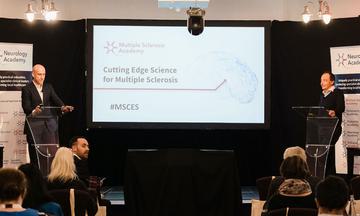
This session is part of a series of write-ups on Cutting Edge Science for Multiple Sclerosis 2021; the conference summary for which is here. The conference was chaired by Dr Wallace Brownlee.
Starting vote: No 63%, Yes 38%
No: Dr David Paling
While there has been an explosion of increasingly effective and targeted treatment options for MS over the last decade, we still cannot not cure it, said Dr David Paling.
“Even the very best treatments in the very best hands are not cures,” he said.
He pointed to data showing that autologous haematopoietic stem cell transplantation (AHSCT) can significantly reduce relapse rates and the course of the disease. It is still, however, not a cure – inflammation persists, and disability progresses in the majority of patients.
He went on to say that we are “held back in our search for a cure in that we lack a true understanding of MS”.
Dr David Paling
“To find a cure, we need to look agnostically at the biology so we can identify groups with common underlying mechanisms,” he said. We currently do not have the research or frameworks to be able to do this, he argued.
“I think we may never cure multiple sclerosis, and I hope just to be able to treat it better.”
Yes: Professor Richard Nicholas
The definition of “cure” is to relieve a person of the symptoms of a disease, not to eradicate any evidence of damage, said Professor Richard Nicholas.
“There are no cures for any kind of cancer but there are treatments that might cure you,” he said.
Professor Richard Nicholas
Curing MS will depend on treating the right person, at the right time, with the right technology, he said, arguing that we are getting closer to that point.
Our current understanding of MS is that it occurs in three phases: initiation that leads to inflammatory episodes, which result in increasing neuronal loss and disability. A single injury, he went on, causes a subsequent change in the brain, meaning that one insult can have a lasting and changing impact.
Rationally, then, a cure would need to be administered early, and might not necessarily eradicate future progression.
“If something is cured, that means you don’t need any more treatment,” he said, highlighting the efficacy of therapies such AHSCT and alemtuzumab at inducing remission in some people.
“I agree that we have to adjust our thinking, but I think we have a lot to hope for when we move beyond some of the standard disease modifying therapies.”
End vote: No 63%, Yes 38%
Reference
Nicholas, R. S., Rhone, E. E., Mariottini, A., Silber, E., Malik, O., Singh-Curry, V., ... & Muraro, P. (2021). Autologous Hematopoietic Stem Cell Transplantation in Active Multiple Sclerosis: A Real-world Case Series. Neurology, 97(9), e890-e901.
This activity has been supported by sponsorship from Roche Products Ltd, Biogen Idec Ltd and Janssen-Cilag Ltd. The sponsors have had no control over the educational content of this activity.

Related articles
Encouraging excellence, developing leaders, inspiring change
MS Academy was established in 2016 and in that time has accomplished a huge amount with exciting feedback demonstrating delegates feel inspired and energised along their personal and service development journeys. The various different levels of specialist MS training we offer are dedicated to case-based learning and practical application of cutting edge research.
